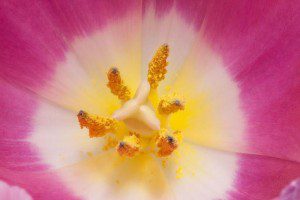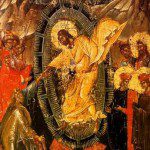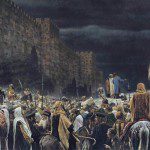
Like pollen or manna
This phrase, “like pollen or manna,” tossed off in Ellen Bass’s strong, startling poem, “Saturn’s Rings,” stopped me short: I love the story of manna in the desert—such a strange and haunting image of God’s imaginative provision. It has remained since childhood one of my favorite Bible stories.
Asked one time by a retreat leader to do a “six-word autobiography,” I wrote “Eat the manna. More will come.” The narrative behind that cryptic exercise would tell of a childhood spent with missionary parents who lived at the edge of poverty, but had experienced enough remarkable and timely provision to trust that what they needed would show up, and to live in expectation and gratitude. That legacy has been a rich one.
To link manna and pollen is to recognize in the ecological economy provision no less remarkable than the appearance of food each morning for the wandering Israelites—and as miraculous. As bee colonies die all over the planet, and their demise puts in one more rather quiet crisis, it seems to me that part of the necessary stewardship to which we’re urgently called now is caring for those little pollinators and the pollen they carry and turn to liquid gold. Angels come in many varieties; perhaps some of them in coats of yellow with black stripes.
In Bass’s poem the speaker, looking at the rings of Saturn, remembering that they are “icy crystals and dust, Mirrors / shepherding the light, collecting it” likens those floating amorphous bits of matter to the pollen and the manna by which we have lived. How we are connected to the geology and geography of deep space remains a mystery. How we are connected to the life forms on our own planet and to each other remains at least partly in the realm of mystery as well. It’s good to enter into those mysteries, not to solve them, but to recognize them as reminders that there are “more things in heaven and earth than are dreamt of” in our philosophy.
And it’s all provision. Or, as Gerard Manley Hopkins puts it in his poem about looking into space at all the “fire-folk sitting in the air,” “it is all a purchase, all is a prize.” The universe cascading forth from the breath of God and reclaimed by the death of Christ offers gift and reward, mystery and alien beauty we cannot own or understand, but can revel in as we receive it, an inheritance that sustains us in ways we can’t wholly account for.
The pollen, the manna, the wheat, the buds, the compost and the worms that make it, the nematodes and nitrogen fixers lie all around us, inconspicuous and essential. We would do well to write a litany of thanks that included them by name—all the orders of being that work together for our good, sometimes with little thanks and, thanks to us, against great odds.
[image courtesy of snappgoat.com]












